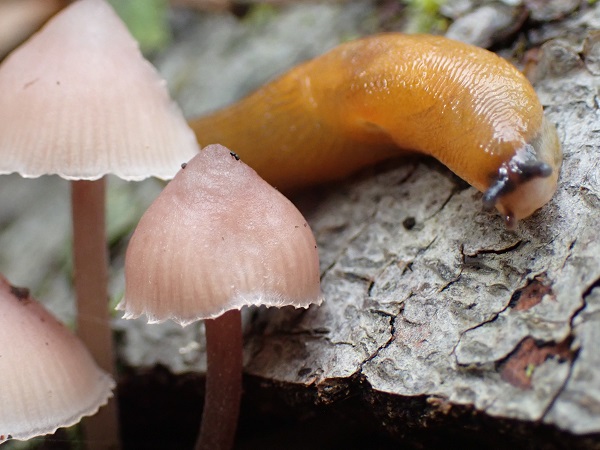 Credit: © Claire Schroeder
Credit: © Claire Schroeder
In the latest in a series of articles about current conservation issues, experts at natur&ëmwelt, a leading nature conservation NGO in Luxembourg, spoke to Chronicle.lu about slugs and their often fraught relationship with gardeners.
Natur&ëmwelt volunteer David Crowther helped collect the relevant information from the NGO for this article.
Chronicle.lu: Slugs seem to be all over the gardens this spring- why is that?
Natur&ëmwelt: Because it’s been an old-fashioned, slow, cool, wet spring - unlike the warm, dry springs we’ve got used to in Luxembourg over recent years.
Chronicle.lu: And what is the connection?
Natur&ëmwelt: Desiccation and locomotion. Slithery, slippery slugs move best over damp, smooth surfaces. They don’t like having to negotiate dry, loose, sun-exposed ground. And that, as we’ll see later, is one of the key considerations if we’re treating them as garden pests.
Chronicle.lu: Are there people who do not regard them as pests?
Natur&ëmwelt: Who are we, Homo sapiens, the most destructive species on the planet, to decide what is or is not a pest? Okay, if you are a gardener, you’re not going to feel exactly well disposed towards these naked snails.
Chronicle.lu: Naked snails? That is an interesting way to describe them…
Natur&ëmwelt: Just quoting their German name: Nacktschnecke. Slugs are indeed one of many types of shell-less gastropods.
Chronicle.lu: What exactly is it that gardeners dislike about slugs?
Natur&ëmwelt: They’re voracious - the slugs, that is. They love eating delicate young shoots and plants, like the ones you’re cultivating so lovingly in your garden. They have a particular liking for lettuce. And they reproduce alarmingly quickly and abundantly.
Chronicle.lu: Tell us about their life cycle.
Natur&ëmwelt: Each slug is a hermaphrodite, but they still have to get together to mate. They lay large clumps of eggs, in the soil or in a shady spot. The eggs can hatch quickly or lie dormant over the winter.
Chronicle.lu: Do slugs have no natural enemies? If they move so slowly and are so ubiquitous, surely they would be easy to catch and eat…
Natur&ëmwelt: They’re easy to catch and would presumably make a copious meal, but hardly any animals will touch them. Hedgehogs and ducks will (Rent-a-Duck startup, anyone?), but virtually nothing else. Slugs are just disagreeably slimy, unappealing and unappetising.
Chronicle.lu: Have humans ever tried eating them?
Natur&ëmwelt: We’ve heard a story of Boy Scouts who experimented with a dish of slugs boiled in salt water. The verdict of those who were prepared to try the delicacy: chewy and tasteless.
Chronicle.lu: So, now we come to the elephant-in-the-room question: how do we rid our gardens of these “unwanted diners”?
Natur&ëmwelt: It depends how callous you’re prepared to be. The sensitive gardener will protect his/her delicate plants by surrounding them with loose, locomotion-inhibiting material, like wood chippings, sawdust, dry compost or crushed eggshells. It also helps to leave a small pile of pulled-up weeds to distract the slugs from your more valuable crops. Our best-practice recommendation is one of various forms of metal, plastic or copper “slug fences” which can be used year after year to deter the little beasties.
Chronicle.lu: And if one is prepared to take more extreme measures?
Natur&ëmwelt: Beer traps are popular. It’s an intoxicating way to drown, though the slimy, beery end product is still a disposal problem. The most effective tactic is undoubtedly to go out with a torch on a damp night and simply collect the creatures.
Chronicle.lu: And then? What is the disposal solution?
Natur&ëmwelt: Well, let’s assume you’re not the kind of person who simply tips a bucketful of slugs into the neighbour’s garden. Slug gatherers who can stomach it cut each one in half with a pair of scissors. And then... Truth to tell, no one’s ever come up with a really satisfactory answer. Wherever you tip dead slugs, it’s going to be a mess, partly because some slug species are cannibalistic. Live slugs eat dead ones. Look, just dispose of the things in a way that won’t harm the environment - we won’t ask too many questions...








